|
What would you do if you found out that someone you love had committed a serious crime? Would you urge them to confess, to come clean to the police in the hope that extenuating circumstances would be taken into consideration and the severity of any punishment adjusted accordingly? Or would the thought of them going to jail be so horrifying that you would assist them in covering up their misdeeds? In the UK at least, that alone would also be subject to criminal prosecution. And what if the crime in question involved the death of another person, whether by accident, intent, stupidity or through action taken in the heat of the moment? It's the sort of cover-up we rarely hear about except in the course of reporting on a violent crime, such as when a teenager commits a random murder and members of his immediate family are charged with obstruction of justice after he (and it usually is a he) is caught. What that often means is that the family members did their damnedest to cover up their offspring's actions and dispose of any evidence linking them to the crime. Chances are that they did so out of a very natural devotion to their child, however wretched he may be. Try telling that to the family of their victim.
In the past, if a film was going to have its lead character commit such a crime, certain ground rules were generally adhered to. For a start, the victim is almost always an adult male, one with a shifty background and on the morally wrong side of a conflict with his assassin, who is probably the victim of abuse, threats or blackmail at his hand. The lead character, on the other hand, is usually a good person at heart, one who has either strayed from the straight and narrow and is now being squeezed for money or pressured to carry out nefarious deeds on his or her victim's behalf, or is being threatened by the prospect of violence against them or their family by someone they have seriously misjudged, only recently met, or even fallen in love with. Thus, while the victim is almost always male, the reluctant killer is often – though by no means always – a woman. It is also important that this persecutor's death is shown to be either accidental or not the result of deliberate action by his supposed killer, whom we are encouraged from the off to see as the real victim of the piece, but who can only stand a chance of going free or making it out of this tale alive if they have not really committed a capital offence. In Production Code era American films, no crime could be seen to go unpunished. Or so the theory goes.
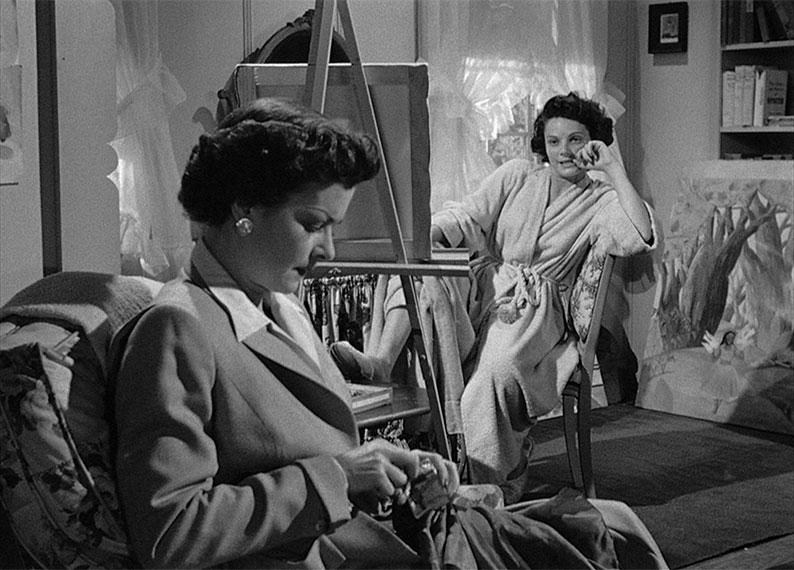
The 1949 noir melodrama The Reckless Moment certainly plays by these conventions in its setup, albeit with a couple of interesting tweaks to the formula. In opens with housewife Lucia Harper (Joan Bennett) driving 50 miles from her home in Balboa to Los Angeles to meet an ex-art dealer named Ted Darby (Shepperd Strudwick), whom her 17-year-old daughter Bea (Geraldine Brooks) is apparently in love with. Lucia wants the 30-something Darby to stop seeing her daughter, a request Darby is only interested in complying with if Lucia is prepared to pay him off. Convinced she now has all she needs to persuade Bea that Darby is just an insincere freeloader, Lucia rejects his proposal and heads straight back home, where Bea refuses to accept her mother's story, and that night sneaks out to keep a secretly arranged meeting with Darby in the family boathouse. When Darby admits that he is hard up and suggests that taking money from her mother might not be a bad thing, Bea becomes angry, and in the ensuing struggle she hits Darby over the head with a torch and runs off. The dazed Darby stumbles after her, but when a railing he grabs hold of for support breaks, he falls into the water and drowns. Technically we could be talking manslaughter here, albeit with a likely self-defence caveat, which is all you really needed to keep the Production Code from demanding Bea pay a legal price for actions she is unaware she's even committed. What happens the next morning is a different story.
Before I get to that, it's worth highlighting the fact that Darby, despite being obviously much older than Bea (not itself unusual in films of that era), is not played as overly sleazy or opportunistic. Indeed, when Lucia first confronts him she initially comes across as an intolerant busybody with a weed up her behind about her free-spirited daughter's offbeat taste in men. Similarly, when Darby makes his admission to Bea about his financial hardship, her over-the-top response (she goes from loving him to detesting him in the blink of an eye) makes him seem like the more level-headed of the two. We've also only his attempt to extort money from Lucia and her claim that she's done her research and knows "what sort of man he is" to sell the idea that he really is a bad match for Bea. Thus, when Lucia sternly first forbids her daughter to see Darby again, it's hard not to find yourself siding with the defiant Bea, particularly after Lucia's prissy claim that Bea's father – who's currently away on business – didn't want her to go to art school because of the sort of people she'd mix with. That would be people like me, matey. Even when Darby struggles with Bea in the boathouse, he doesn't physically assault her, just grabs her arms in an attempt to get her to listen to what he is saying, albeit with a cocksure smile on his face. When he falls into the water there's thus no sense that he in any way had this coming, more a feeling of "oh crap!" both for him and the likely impact it will have on Bea later.
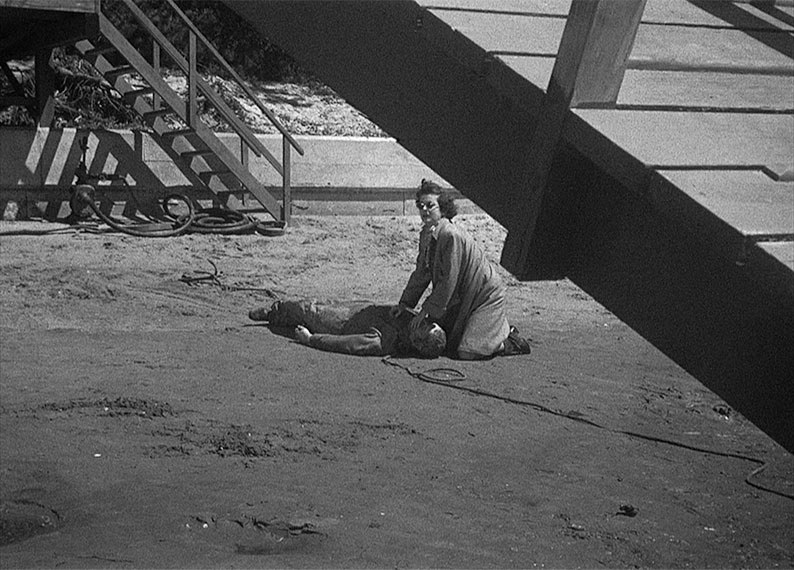
After Bea tearfully confesses to her mother that she's fallen out with Darby and admits that she hit him, the protective Lucia goes out to the boathouse but finds no evidence of foul play. The next morning, however, she's out for a walk when she finds Darby's body washed up on a nearby beach. So what does she do? She drags the body down to the waterline, hauls it into a small boat and rows it off to a spot that won't point a finger of suspicion at Bea. Theoretically, this is a sound enough move, given that Lucia appears to be the only one who knows about Bea's relationship with Darby and that Darby is an out-of-towner who is likely unknown to the local authorities. Let's hope they don't do something rash like talk to their wily counterparts in Los Angeles.
Hoping that the whole thing will blow over, Lucia opts not to reveal to Bea what she's been up to that morning, but things take a problematic turn when the smooth-talking loan shark Martin Donnelly (James Mason) turns up her door waving letters written by Bea that romantically link her to Darby, for which he is demanding $5,000 that Lucia simply doesn't have. And she'd better find it, Donnelly warns, or she's likely to get a visit from his considerably less reasonable partner, Nagel (Roy Roberts). But as Donnelly continues to press the increasingly desperate Lucia for the money, he begins to sympathise with her situation and over time realises that he is developing feelings for her.
The Reckless Moment, which was adapted by a quartet of screenwriters (plus uncredited contributions from James Mason's wife Pamela) from a Ladies' Home Journal story titled The Blank Wall by Elisabeth Sanxay Holding, was to prove the final American film from German director Max Ophüls, who subsequently returned to Europe to direct what remains one of his most justly celebrated films, the 1950 La Ronde. And while The Reckless Moment may not be held in quite the same regard as the best of his European output (the battles Ophüls had with the producers over his approach to cinematic storytelling are detailed in the special features), it still very much bears the director's distinctive stamp. This is particularly evident in his use of long takes and fluid camera moves, which sees whole sequences captured in a single shot instead of more traditional coverage and editing, an approach that almost invisibly bonds the camera (and, by viewpoint association, the audience) to the lead characters, and by moving through their environment with them it encourages us to feel part of their world. This is aided further by the director's talent for making locations and sets feel genuinely lived in and his knack for delivering key plot points in a conversational manner instead of over-emphasising them, all of which contributes to the smooth narrative flow and gives the film a degree of freshness that belies its age. The key thing is that this never feels flashy or attention-grabbing, and is so subtly executed that I was two viewings in before I really became aware that this is what Ophüls was doing.
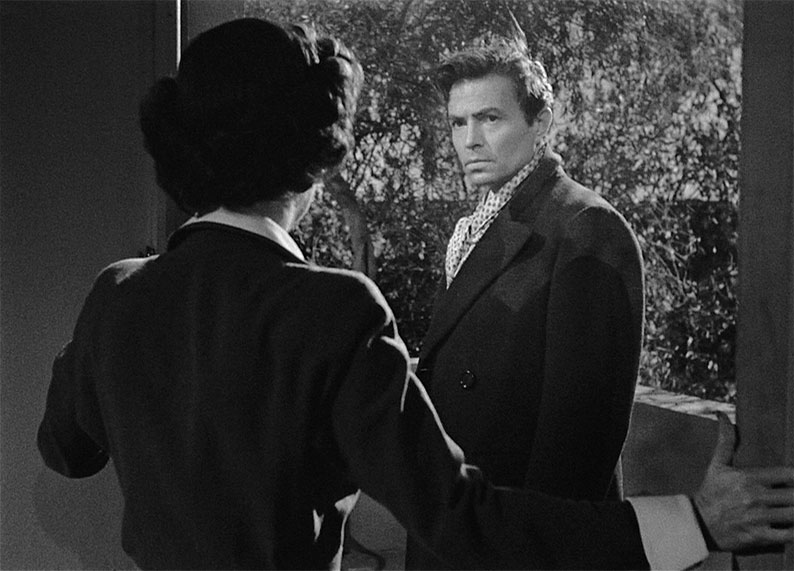
Working against the story a little is the inevitable need to compress Donnelly's gradual change of heart and Lucia's uncertain response to it into a credibility-stretching short timeframe (that said, the film is from an era when screen couples would regularly fall in love in what felt like a couple of heartbeats), and once Donnelly starts sympathising with Lucia there's a degree of inevitability to how the situation will ultimately be resolved. Countering this, however, is the thematic boldness that sees a happily married woman who is willing to put everything on the line for her family become emotionally drawn to a criminal who is attempting to extort her. The film certainly earns its noir credentials here, and especially in the almost censor-baiting sequence in which Lucia drags Darcy's body down the beach and into a boat for disposal, all in the name of motherly love. Things come to a head in the final scenes in a manner that I can't discuss without delivering a massive spoiler, and particularly a phone call that sees the emotionally distraught Lucia torn straight down the middle between love for her family and utter despair, a gut-wrenching moment that Joan Bennett pulls off with genuine aplomb.
Quite why Donnelly should find himself so readily sympathising with Lucia raises some questions that the film does not answer but that are certainly interesting to speculate on, particularly in light of his clearly subservient relationship to Nagel, whom you suspect has been doing this a lot longer than him. The casting of James Mason is a masterstroke here, able as he is to exude an air of calm menace one minute and seem genuinely caring the next without dramatically altering his delivery. This is put to particularly effective use when he starts interracting with Lucia's young son Davis (David Bair) and her father Tom (Henry O'Neill) in a manner that prompts them to take a liking to him unaware as they are of his true reason for being there. Equally telling are the lengths Lucia is prepared to go to in order to keep the blackmail attempt secret from her blissfully unaware family, something made all the more difficult by her determination not to involve her husband and how limited her own financial resources are. There's also a subtle suggestion that the family maid Sybil (a criminally uncredited Frances E. Williams) is the real level-headed moral core of a family she is only technically part of – before the film's end I suspected that if Lucia had confided in her from the start then the whole mess would have been sorted in no time at all. It's one of many small but intriguing subtextual strands to a film that succeeds a as a noir melodrama, but whose biggest rewards are supplied by the rich complexity of what's going on beneath the surface.
A strong 1.37:1 transfer from a Sony HD remaster that nails those all-important noir black levels (which do soften just the smallest notch during some night exteriors to retain picture detail) and boasts a generous tonal range throughout. The image is consistently crisp – pattern detail on clothing is distinct throughout – and a fine film grain is visible. Dust and damage have been eliminated, with only a hint of flickering on skies in some shots.
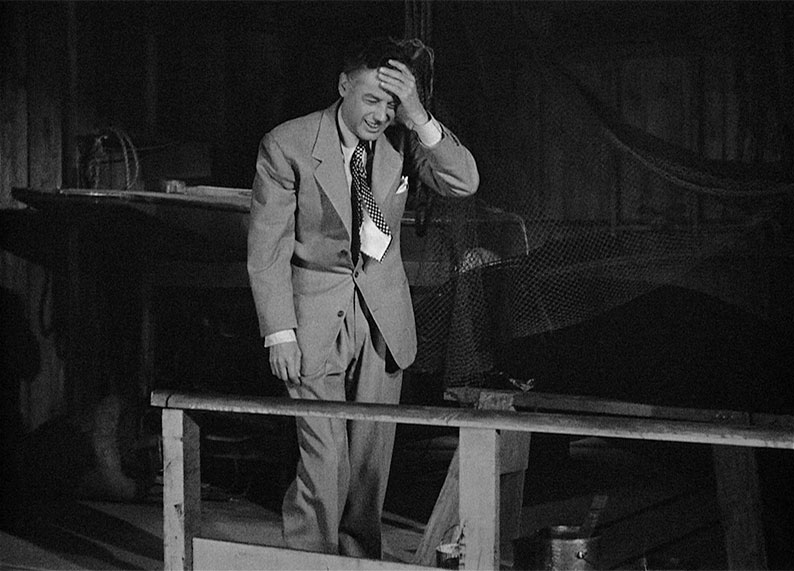
The Linear PCM 2.0 mono track has the expected limitations on its dynamic range, but is otherwise clear and free of damage.
Optional English subtitles for the hearing impaired are also available.
Making an American Movie (44:04)
A Fiction Factory production in which artist and author of Max Ophüls in the Hollywood Studios Lutz Bacher provides an in-depth look at the film and its production, including breakdowns of how specific scenes were shot, information on location shoots, the issues Ophüls had with the studio bigwigs due to his filmmaking style and the changes this forced on his original plans for certain sequences, as well as how he sought to fool them with a fake shooting script containing details of more conventional camera setups. There's occasionally a sense that Bacher's love of the director's work is prompting him to read things into shots and sequences that may never have been intended, but he still makes a persuasive and always interesting case for Ophüls' approach to film storytelling.
Maternal Overdrive (22:58)
An interview with Far From Heaven, I'm Not There and Carol director Todd Haynes, who expresses his appreciation for a film that for years was regarded as a bit of a lost classic, outlines how the film came to be, salutes Joan Bennett's performance, highlights the importance of housekeeper Sybil, and plenty more. He reveals that the reason the film wasn't directed by Jean Renoir (apparently James Mason's first choice) is that he was too expensive, and makes intriguing observations about how shadows invade the Harper household in tandem with criminal activity and how women running families were then so financially dependent on their husbands.
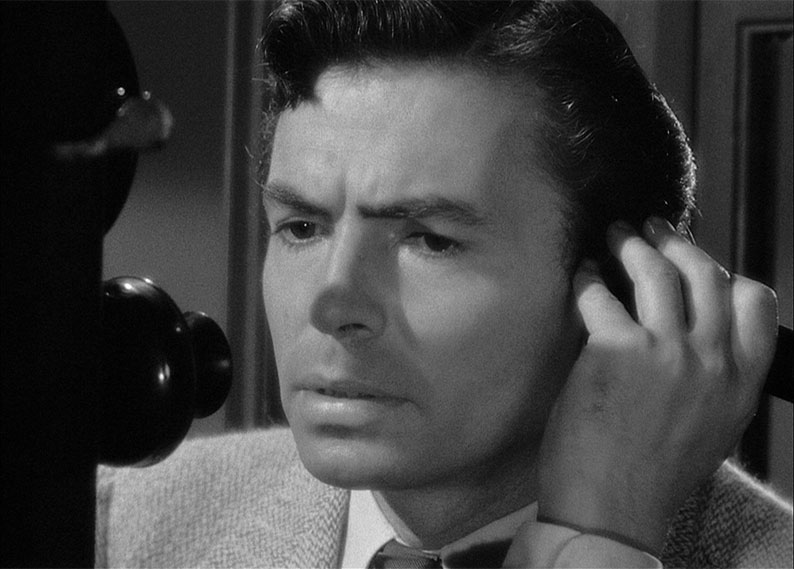
James Mason as Homme Fatal (26:23) / Focus on James Mason: Audience Discussion (39:21) / James Mason: Watching the Violence Unfold (32:34)
Three extras that are essentially three parts of the same event titled Focus on James Mason, which was held at Birkbeck, University of London on 26 May 2018 and framed around a screening of The Reckless Moment. Although something of a gift for any thoughtful disc release of the film, I'm in two minds about all three of these inclusions. The discussions are definitely of interest, but there's a suspicion that they were originally filmed for record purposes rather than for any thought of wider distribution, which is why all three segments are captured in a single wide shot from a low angle just off of the corner of the stage, which frames the speakers and the screen behind them in a single shot without having to switch angles or edit the footage afterwards (although it should be noted that Indicator have broken this up a little by inserting film clips). What this means is that whoever is speaking is some distance from the camera and addressing an audience that we are not really part of, which lacks that connection with the speaker you get with a traditional filmed interview. The first part is effectively a pre-screening introduction to The Reckless Moment, in which Adrian Garvey talks about James Mason's early film career and particularly the noir-leaning films in which he appeared. The second is a post-screening discussion in which Garvey and Sarah Thomas answer questions about the film from the audience, some of which are more interesting than others. In the third, Sarah Thomas talks in detail about Mason's work in The Deadly Affair (also available on Indicator Blu-ray) and the 1975 Italian mystery drama, A Flower in His Mouth, which includes major spoilers for both films, a warning for which is kindly provided. Having spent a few years in education myself, I have to say this as a whole does feel like the college lecture it effectively is, and while for it is definitely of interest, I never found it particularly engaging. I've no doubt others will get more out of it that I did, so believe this is still a very worthwhile inclusion.
Isolated Music and Effects Track
It's here for those who enjoy such things.
Image Gallery
29 slides of monochrome promotional photos, garishly coloured FOH stills and international posters.
Booklet
Things get off to a belting start here with an excellent essay on Ophuls' quartet of American films by Indicator regular Samm Deighan, which is followed by an introduction to Ophüls' work by Andrew Sarris, penned in 1971 for a Film Comment retrospective. Next up is an enjoyable article written by Ophüls himself in 1955 for Cahiers du cinéma examining the state of contemporary American film, and a short retrospective piece written by Ophüls in 1956 that looks back at his career. Bringing up the rear are archive reviews from Sight and Sound and Cahiers du cinéma. Full credits for the film and publicity images have also been included.
The final American film from one of 20th Century cinema's acknowledged masters is an involving, grippingly performed and captivatingly directed blend of film noir and romantic melodrama, and while not quite in the class of his most celebrated (European) work, it still has much to recommend it. As ever, Indicator have delivered the goods here, with a top-notch transfer and a strong selection of extra features – that fact that I wasn't as enthralled by three of them as others might be you can chalk up personal taste. Definitely recommended.
|